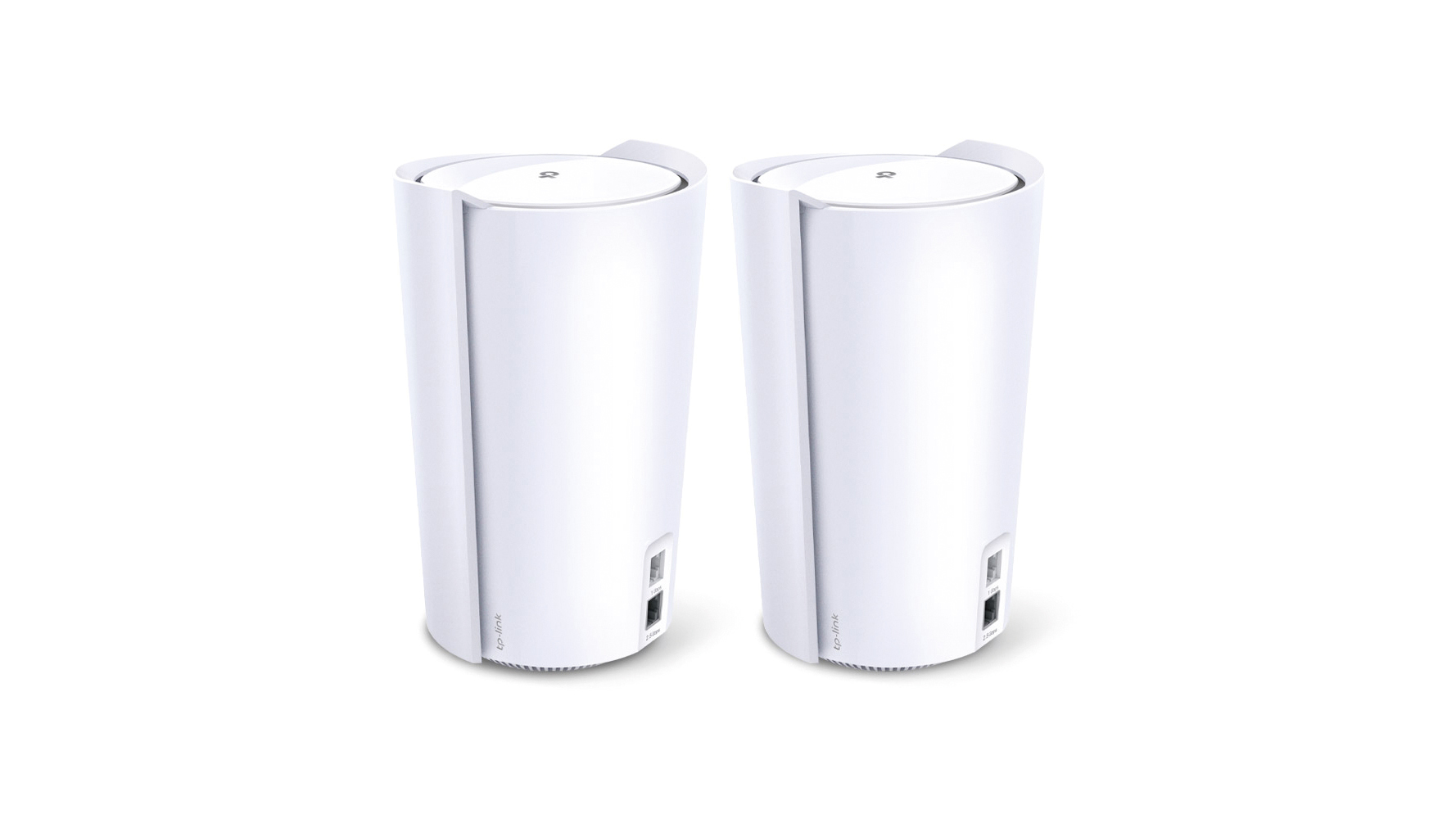TP-Link Deco X90 review: A winning sweet spot
You can pay less for a Wi-Fi 6 mesh, but the X90’s superb coverage and astonishing speeds justify the price


-
+
Outstanding performance & range
-
+
Great value
-
+
2.5GbE connections
-
-
Not as configurable as some rivals

Some mesh systems focus on high-end performance, others prioritise affordability. The Deco X90 finds its own balance: it’s hardly a budget system, but it’s competitively priced considering it promises to deliver Wi-Fi 6 for up to 200 devices, throughout a home of up to six bedrooms.
Despite those ambitious claims, the kit contains only two stations. They’re not much to look at, but they’re tasteful, with a single status LED near the base of each one. If you need to extend the system’s footprint, an additional unit costs £245. The X90 doesn’t support Wi-Fi 6E, but it works so well over regular Wi-Fi 6 that may not matter.
It’s a regular tri-band design, with each unit containing a legacy 2.4GHz radio plus two independent 5GHz transmitters, ensuring that the client network doesn’t get bogged down with backhaul traffic. The backhaul connection is rated at a comparatively slow 1.2Gbits/sec, while the main network runs at up to 4.8Gbits/sec. However, the backhaul can borrow bandwidth from the primary network when needed, allowing the system to dynamically adapt to demand.
Both stations are also equipped with a 2.5Gbits/sec Ethernet socket, as well as an ordinary gigabit connector. It’s great to have this ultra-high-speed option, although a few more sockets would be welcome, especially since one of the ports on the primary unit is needed for your internet connection. Still, if you want to hook up several wired devices, a five-port 2.5GbE switch costs less than £100.
Setting up and managing the Deco X90 means installing the smartphone app, as the web console shows only basic information about your network. The app is easy to get on with, and provides basic settings such as IP address reservation, port forwarding and guest network control. In some areas the Deco isn’t as configurable as rival meshes from Asus or Netgear: you can turn the 2.4GHz and 5GHz networks on and off independently, but you can’t tweak the automatically selected frequency settings, and there’s no support for VPN connections, either incoming or outgoing.
On the plus side, network security and parental controls are on hand courtesy of TP-Link’s HomeShield. Although the full feature set requires an annual subscription, the free tools are pleasingly usable, allowing you to carry out on-demand network scans, apply category-based website filtering and set a simple access schedule for kids. Subscribing to the Pro package for £54 a year unlocks proactive security scanning, more flexible access controls for individual devices and extensive reporting.

For smart home fans, the Deco app doubles up as an IoT control centre. One-tap actions and automatic triggers let you control smart lights and switches from brands including Philips Hue, Samsung SmartThings and TP-Link’s own Kasa series.
While these are decent features to have, they’re the same as cheaper Deco systems, such as the £270 Deco X20. What sets the X90 apart is performance. To test this, we set up the system in our test premises, with the main unit at one end and the secondary one at the opposite end of the adjoining room. We connected an Asustor Drivestor 4 Pro NAS to the 2.5GbE socket of the primary Deco unit, carried a laptop to various places in the building, and measured file-copy speeds to and from the NAS.
The results were striking, to say the least. When the Netgear Orbi RBK752 arrived last year, its close-range download speeds of nearly 60MB/sec seriously impressed us. This time, the Deco X90 blew that away with a phenomenal same-room rate of 148MB/sec. That’s the fastest performance we’ve seen from any mesh, even beating the £1,500 Orbi RBKE963, which peaked at 118MB/sec over a Wi-Fi 6E connection.
The Deco X90 isn’t only fast up close. Performance predictably dropped off once we moved into other rooms, but no matter where we wandered, it consistently delivered download speeds between 60 and 70MB/sec. Indeed, the slowest speed we saw anywhere from the X90 (62MB/sec) was higher than the fastest speed the RBK752 ever managed to muster, even when our laptop was sitting mere metres from the transmitter.
The Deco X90 didn’t take the crown in all our tests. The Orbi RBKE963’s Wi-Fi 6E support allowed it to top 70MB/sec at long range when downloading to a 6E client. That system costs three times as much, though, so you’d expect it to have an advantage: it’s only surprising that the gap wasn’t larger.
By comparison, for what you get the Deco X90 is remarkably affordable. For those on a moderate budget the Linksys Atlas Pro 6 is cheaper, but if you demand high speeds and wide coverage then the Deco X90 is an obvious choice. Far faster than the older generation of Wi-Fi 6 meshes, yet much cheaper than the incoming wave of 6E hardware, it hits a winning sweet spot that no other system has managed to locate.
TP-Link Deco X90 specifications
| Band support | Tri-band 2.4GHz/5GHz Wi-Fi 6 |
| Radios | 6 x internal MU-MIMO antennas (per unit) |
| Ports | 1 x GbE, 1 x 2.5GbE (per unit) |
| Dimensions (WDH) | 130 x 123 x 210mm (WDH) |
| Weight | 610g (per unit) |
Get the ITPro daily newsletter
Sign up today and you will receive a free copy of our Future Focus 2025 report - the leading guidance on AI, cybersecurity and other IT challenges as per 700+ senior executives
Darien began his IT career in the 1990s as a systems engineer, later becoming an IT project manager. His formative experiences included upgrading a major multinational from token-ring networking to Ethernet, and migrating a travelling sales force from Windows 3.1 to Windows 95.
He subsequently spent some years acting as a one-man IT department for a small publishing company, before moving into journalism himself. He is now a regular contributor to IT Pro, specialising in networking and security, and serves as associate editor of PC Pro magazine with particular responsibility for business reviews and features.
You can email Darien at darien@pcpro.co.uk, or follow him on Twitter at @dariengs.
-
 ‘Phishing kits are a force multiplier': Cheap cyber crime kits can be bought on the dark web for less than $25 – and experts warn it’s lowering the barrier of entry for amateur hackers
‘Phishing kits are a force multiplier': Cheap cyber crime kits can be bought on the dark web for less than $25 – and experts warn it’s lowering the barrier of entry for amateur hackersNews Research from NordVPN shows phishing kits are now widely available on the dark web and via messaging apps like Telegram, and are often selling for less than $25.
By Emma Woollacott Published
-
 Redis unveils new tools for developers working on AI applications
Redis unveils new tools for developers working on AI applicationsNews Redis has announced new tools aimed at making it easier for AI developers to build applications and optimize large language model (LLM) outputs.
By Ross Kelly Published
-
 Google layoffs continue with "hundreds" cut from Chrome, Android, and Pixel teams
Google layoffs continue with "hundreds" cut from Chrome, Android, and Pixel teamsNews The tech giant's efficiency drive enters a third year with devices teams the latest target
By Bobby Hellard Published